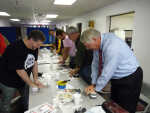Red Cross talks preparedness and provides hands-only CPR training at Lions Club

Nevada Daily Mail
American Red Cross Recruitment and Programs Specialist Teresa Layton gave an overview of emergency and disaster preparedness and planning at a recent Nevada Lions Club meeting.
She told those in attendance of the three steps to being prepared, beginning with step one; create a plan for you, your family, and your business. Your family might not be together when an emergency happens.

"That's why it is important to have a plan in place," she said. "Sit down and talk to your family about how you will reach each other in different situations. Prepare a shelter at home. Make sure everyone in the family can get to a safe place and find each other in the event of an emergency.
"It is a great idea to designate two family meeting places, one in the neighborhood and one farther away.
"You should plan for two situations -- staying home or leaving," she noted. Deciding whether it is best to stay or go depends on the type of emergency. Officials may tell you what you need to do.
In some cases, limited communication and information may require you to decide what is best for you and your family, she said.
"Sometimes it may not be safe to stay in your home. Plan where your family can meet. Know where you will go and how you will get there if you have to leave your home."
Step two, she said, was to prepare an emergency kit for home, car, and work.
"For your home, during an emergency, you may not be able to get food or water for days or weeks, and your electricity may not be working."
The following items should be part of your "Emergency Kit" and kept in a container that can be easily carried if you need to leave home, she said.
Water -- families should set aside one gallon of water per person per day, to last three days.
Canned or dried food -- families should set aside a three-day supply of food per person. The food should be non-perishable items that don't need to be cooked, such as tuna and crackers.
"Remember to include a manual can opener."
If there's an infant in the house, include formula and baby food.
Include a battery-powered radio and flashlight and extra batteries for the radio and flashlight.
Be sure to include a list of prescription medications, important family documents, and a first-aid kit, she added.
For your car, she suggested keeping a small, portable emergency supply kit at all times. You should include a gallon of water, several cans of food, a manual can opener, blankets, sleeping bags, money, and first-aid supplies. At work, she said to keep your own supply of fresh water and canned food, a flashlight, and battery-powered radio at your desk or in your locker. "Everyone should consider keeping a change of clothes, and a pair of strong, practical shoes or boots at work."
For your pets, Layton said to make sure you have identification tags and up-to-date vaccinations. If you must leave home, bring your pet with you, if possible.
"You can plan ahead by creating a supply kit for your pet that includes extra food, water and medications. A carrier and leash will also be important. For cats, remember to include extra litter."
The third point she said was to listen for information about what to do and where to go during an actual emergency.
"It is important to stay calm in an emergency. Get as much information about the situation as possible. If there is no electricity, make sure to have a battery-powered radio with extra batteries so you can listen for updates and instructions.
"City, county, and state officials have developed emergency plans. In the event of an actual emergency, it's important to follow their instructions and advice. They will provide you with the latest information."
She added that there are special situations that you should plan for such as including emergency planning for children at school and people with special needs.
Layton then discussed the hands-only CPR and how to respond to cardiac and breathing emergencies in adults with an emphasis on hands-on learning.
The Lions Club members participated in hands-on learning using actual training aids.
Studies have shown that being trained in hands-only CPR can make the lifesaving difference when someone suffers sudden cardiac arrest, she said.
The Red Cross offers classes on CPR, blood borne pathogens, baby sitter training, wilderness first aid, instructors training, and lifeguarding. Contact Peggy Tedlock at 667-5563 in the Nevada American Red Cross Office for details on classes.
